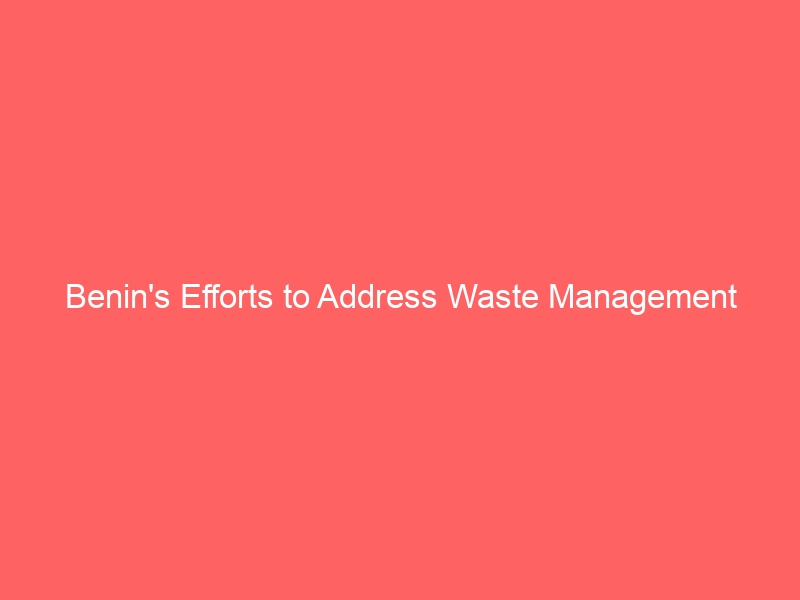Benin, a small country in West Africa, has been facing the challenge of waste management for several decades. The growing population and urbanization have led to an increase in the amount of waste generated, putting pressure on the country’s limited resources and infrastructure. In response to this challenge, the government of Benin has been making efforts to address waste management through incineration, a process that involves the combustion of waste materials to reduce their volume and create energy.
The Need for Action
The issue of waste management in Benin has become a major concern due to the negative impact of improper waste disposal on public health, the environment, and the economy. Trash can be found piled up on the streets, in rivers, and on open, unregulated dumpsites, leading to pollution, the spread of diseases, and the degradation of natural resources. In addition, the lack of a proper waste management system has hindered the country’s development and attractiveness for investors.
The Challenges
Benin’s efforts to address waste management through incineration are not without challenges. One of the main challenges is the lack of financial resources to invest in adequate infrastructure and technologies for waste treatment. In addition, there is a need for public awareness and behavioral change to promote the segregation and recycling of waste. Furthermore, there are concerns about the potential environmental and health impacts of incineration, as well as the need to comply with international standards and regulations.
The Approach
In response to these challenges, the government of Benin has been implementing a multi-faceted approach to address waste management. This approach includes the promotion of waste segregation and recycling, the construction of modern waste treatment facilities, and the development of policies and regulations to support sustainable waste management practices. In particular, the government has been focusing on incineration as a way to reduce the volume of waste and generate energy.
Incineration as a Solution
Incineration is the process of burning waste materials at high temperatures to convert them into ash, gas, and heat. This process reduces the volume of waste by up to 90 percent and generates energy that can be used for electricity or heat. Incineration also helps to minimize the release of harmful pollutants and greenhouse gases, as modern incinerators are equipped with advanced air pollution control systems. In addition, incineration can be used to treat a wide range of waste materials, including municipal solid waste, medical waste, and hazardous waste.
The Advantages
Incineration offers several advantages as a waste management solution for Benin. First, it helps to reduce the volume of waste that ends up in landfills, which are often poorly managed and prone to causing environmental pollution. Second, it can generate energy that can be used to power homes, businesses, and industries, thus reducing the reliance on fossil fuels and contributing to energy security. Third, it can help to reduce the release of harmful pollutants and greenhouse gases, improving air quality and mitigating climate change. Finally, it can create job opportunities and support the development of a circular economy by recovering valuable materials from waste.
The Challenges and Controversies
Despite the advantages of incineration, there are still challenges and controversies surrounding its implementation in Benin. One of the main challenges is the need to invest in modern and efficient incineration technologies, which require substantial capital and technical expertise. In addition, there are concerns about the potential health impacts of incineration, as the process can release harmful pollutants such as dioxins and heavy metals. Furthermore, there is a need to ensure that the incineration facilities comply with international standards and regulations to protect the environment and human health.
Frequently Asked Questions
1. Is incineration a sustainable solution for waste management in Benin?
Incineration can be a sustainable solution for waste management in Benin if it is implemented with proper technologies and regulations to minimize the release of harmful pollutants and greenhouse gases. It can help to reduce the volume of waste that ends up in landfills, generate energy, and support the development of a circular economy.
2. What are the potential health impacts of incineration?
The potential health impacts of incineration include the release of harmful pollutants such as dioxins and heavy metals, which can pose risks to human health. However, modern incinerators are equipped with advanced air pollution control systems to minimize these impacts.
3. How can incineration support the development of a circular economy in Benin?
Incineration can support the development of a circular economy in Benin by recovering valuable materials from waste, such as metals and energy-rich materials, and using the energy generated to power homes, businesses, and industries.
4. What are the alternatives to incineration for waste management in Benin?
Some alternatives to incineration for waste management in Benin include waste segregation and recycling, composting, anaerobic digestion, and landfilling with proper management and gas capture.
Conclusion
Benin’s efforts to address waste management through incineration reflect the country’s commitment to finding sustainable solutions to the growing challenge of waste generation. By investing in modern incineration technologies and promoting the sustainable management of waste, Benin can improve public health, protect the environment, and support economic development. However, it is important for the government to ensure that incineration is implemented with a focus on environmental and human health protection, as well as compliance with international standards and regulations. With proper planning and oversight, incineration has the potential to play a key role in the country’s efforts to create a cleaner and more sustainable future.








